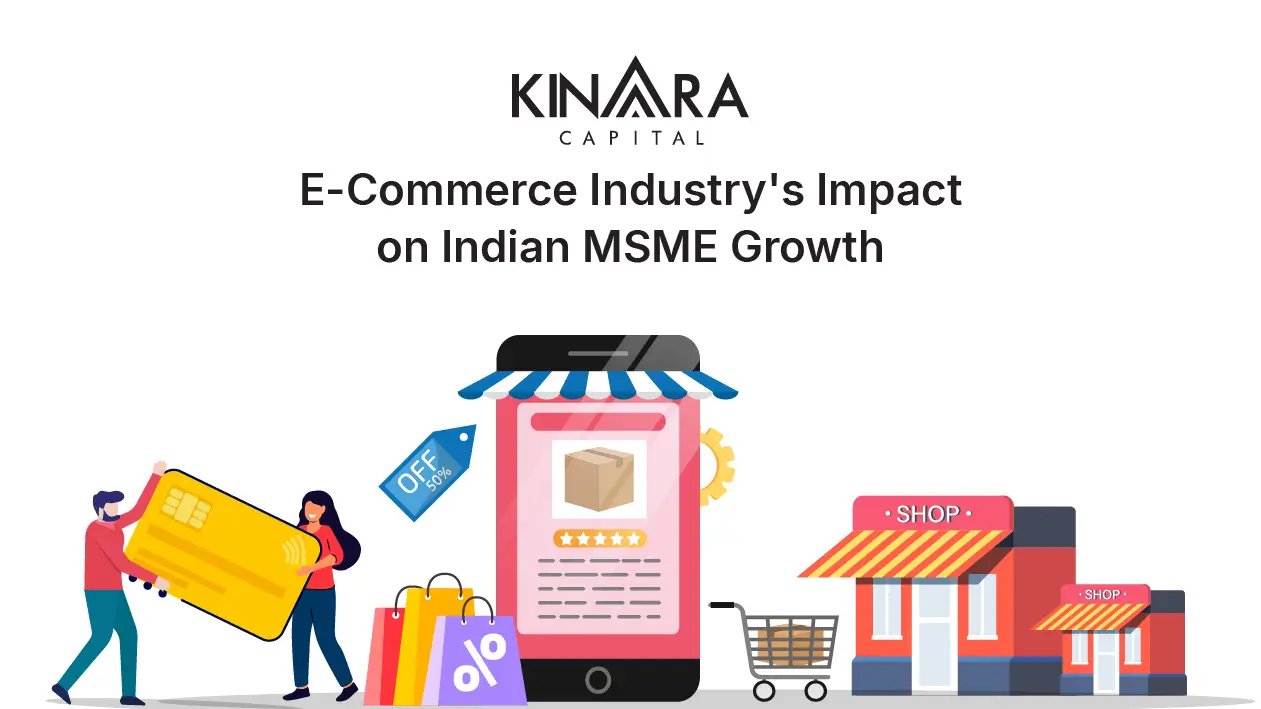
Micro Small Medium Enterprises are the major contributors to the socio-economic growth of the Indian economy. As of February 5, 2024, women-owned MSMEs make up 20.5% of Udyam Portal registrations, accounting for 18.73% of employment and 10.22% of total turnover. These small businesses manufacture over 6000 products ranging from traditional to high-tech products in the country.
E-commerce is the online stage that allows the online trading of products from various industries. The growing number of smartphone users and the transformation of technology has made a significant increase in the use of the internet leading to a boom in the e-commerce industry. The customer engagement with a number of e-commerce platforms and MSMEs gaining knowledge for online trading has initiated their journey with the leading portals.
In a nation that is developing at a higher rate, the rise in the number of MSMEs and their growth has broadened their opportunities to sell their products around the country. E-commerce is the most accessible platform, and MSME inclusions will be catered to effectively.
At the CII Indian MSME Growth Summit, Verma said that MSMEs play an important role in the creation of jobs and the expansion of the manufacturing industry; hence, there is a need to focus on their enhancement to achieve a USD 5 trillion economy. He added, “Small businesses need to improve their management skills and make their technology base smart. In recent years, online markets have developed through e-commerce which has had a positive impact on MSMEs”.
“MSME can generate higher profits through e-commerce. It will increase revenue margin and margin, extend reach to new markets, help them save marketing expenses, and customers will get a better experience”.
As per the stats, around 56% of the MSMEs are a part of the E-commerce industry. Some advantages that the small business owners can reside for them are listed below:
Whether central or state, the Government of India has always supported the growth of the MSME sector. Regardless of industry or domain, small businesses play an essential role, and their growth will increase the country’s economic growth.
E-commerce has brought transformative opportunities for small-scale industries in India, significantly impacting MSME growth. By leveraging digital platforms, MSMEs can streamline operations, reduce costs, and focus on delivering high-quality products and services. The e-commerce industry in India has enabled these businesses to expand their customer base and break free from geographical limitations, accessing national and international markets. Additionally, e-commerce platforms offer tools like inventory management, data analytics, digital marketing, and supply chain management, which enhance efficiency and credibility, further driving the role of e-commerce in the business economy and supporting the success of MSME e-commerce.
Accelerating the digitisation of small-scale industries is essential to strengthening India’s fragile economic recovery. The e-commerce industry in India plays a critical role in this, as it allows MSMEs to integrate technology into their processes, inventory management, and market interactions, either directly or through MSME e-commerce platforms. This digital transformation is vital for MSME growth, helping artisans and farmer-producer organisations sell online and receive necessary marketing support.
A crucial step in this process is creating an enabling GST ecosystem. Ensuring GST parity for MSMEs, whether they operate online or offline, will help integrate them into the e-commerce ecosystem, further driving the role of e-commerce in economic development. Simplifying GST registration for small offline sellers will improve tax collection and transparency.
Tech companies are contributing to the growth of small-scale industries in India by developing tools that enhance the efficiency and profitability of MSMEs. For instance, Google’s initiatives like “Google Advantage” and “Google My Business” are designed to support MSMEs and startups thriving within the online marketplace.
Lastly, the government can simplify the Place of Business (PPoB) requirements by digitising them. This would enable MSMEs and small-scale industries in India to obtain state-level GST without needing a physical presence, thus broadening their reach and impact.
To conclude it could be said that e-commerce has a great impact on the growth of MSMEs by providing them unending opportunities to market and sell their products at any point of time without the restriction of location. E-commerce has benefited these small businesses by removing the barriers, providing them with a great consumer experience and base leading to the expansion of their sales.
Kinara Capital, a leading fintech company is an RBI Registered Systemically Important NBFC in India which aims to empower small business owners by providing them collateral-free business loans. Kinara provides its services in 4500+ pin codes across 100+ cities and has disbursed over 100000 business loans worth over INR 6500 crores till date.
To expand your business, check your loan eligibility in the myKinara app in 1 minute with 7 language options available, choose your preferred vernacular language. Also, we have a dedicated customer support team available between Monday – Friday (9.30 AM – 6.00 PM) at our toll free number 1800-103-2683 for any questions or assistance. This ensures that entrepreneurs can get the help they need throughout the loan process.
1.What are the growth factors of e-commerce?
Key growth factors for e-commerce include increasing internet penetration, mobile device usage, digital payment adoption, and consumer demand for convenience.
2.What is the role of e-commerce in MSME growth?
E-commerce provides MSMEs broader market access, enabling them to reach customers nationwide and globally, thus driving business expansion and revenue growth.
3.What are the main challenges faced by MSMEs in India?
MSMEs in India face challenges such as limited access to finance, a lack of technological infrastructure, regulatory hurdles, and intense market competition.
4.What is the impact of e-commerce?
E-commerce has revolutionised business by increasing market reach, reducing operational costs, and providing real-time data for better decision-making.
5.How does e-commerce affect business growth?
E-commerce accelerates business growth by expanding customer bases, enhancing sales channels, and streamlining operations through digital platforms.
